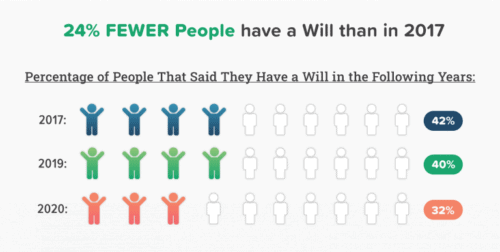Former Zappos CEO Tony Hsieh died in house fire last month. The tech entrepreneur was 46 years old, worth a reported $1 billion, and didn't have a will.
We've heard this story before. Wealthy public figures like Prince, Aretha Franklin, and Sonny Bono all died without having wills in place, despite their massive estates. And it's a problem that isn't exclusive to the rich and famous; the majority of of Americans will die without a will. In fact, according to Caring.com’s 2020 Estate Planning and Wills Study, 68% of Americans do not have a will - up 58% in their 2017 survey.
Probate: Without a Will, the Courts will Decide
Everyone, regardless of their net worth, age, or health and marital status should have a will because when a person passes away without one, the estate is left to the probate courts to divide and distribute. No one can determine exactly how long the probate process will take. Even in an ideal situation where there is a will in place, probate can take as long as 18 months. Without a will, probate can take even longer.
Probate is a lengthy process for many reasons. The first is that there is a monumental amount of paperwork associated with probate, and the more complicated an estate, the more paperwork there will be. Probate courts are also notorious for having a large number of caseloads, and limited staff to handle those cases.
When a person dies without a will, their estate is subject to the state’s intestacy succession laws, and a judge will determine how to distribute the estate. For example, in Maryland, the surviving spouse and children are the first to receive portions of the estate. Also, when there is no will outlining the executor, the court must also appoint a personal representative, which is just one more step that causes probate to take even longer.
How to Expedite the Probate Process
The best way to expedite the probate process is to create a will, which is often the first step for many people in the estate planning process. A will specifically outlines how assets are to be distributed, which helps shorten the probate process, as a judge does not have to make these decisions. Wills also outline the executor of the will, eliminating a step from the probate process. When creating a will, it is also extremely important to work with an estate planning lawyer. An attorney will ensure a will is enforceable, making it harder for other parties to contest it.
Another effective way to expedite the probate process is to create a revocable trust. Assets placed in a trust are protected and typically do not have to go through probate. The fewer assets there are to move through probate, the faster loved ones can move through the process.
An Estate Planning Attorney Can Help Your Estate Avoid Probate
Helping your loved ones avoid probate can help them not only receive portions of your estate faster, but it is also beneficial when they are trying to move on with their lives. If you live in Maryland, Virginia, or Washington D.C., our attorneys can help you create an estate plan that will reflect your final wishes and accelerate the probate process for your beneficiaries. Call us at (301) 468-3220 or contact us online to speak to one of our attorneys today.
